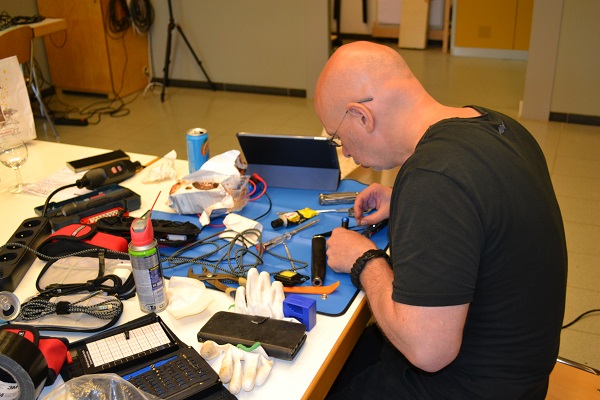 Repair Café;
Credit: © natur&ëmwelt
Repair Café;
Credit: © natur&ëmwelt
In the latest in a series of articles about current conservation issues, experts at natur&ëmwelt, a leading nature conservation NGO in Luxembourg, spoke to Chronicle.lu about human consumption habits and their impacts on the environment.
Natur&ëmwelt volunteer Claire Schroeder helped collect the relevant information from the NGO for this article.
As natur&ëmwelt noted, high incomes and a love of comfort make Luxembourg a famously consumerist society. But smart choices can help people enjoy the things they love without costing the planet.
Chronicle.lu: We often hear that we live in a "consumerist society". What does that even mean?
Natur&ëmwelt: A consumerist society simply refers to one in which identity, worth and happiness are strongly tied to the consumption of goods and services. In these societies, consumption is an integral part of daily life and the economy. Luxembourg is considered a consumer-oriented society due to high income levels, a strong economy and retail sector, and a cultural emphasis on comfort and quality of life. However, this can lead to sustainability challenges, with over-consumption requiring disproportionate resource use and generating excessive waste.
Chronicle.lu: Surely it is okay to buy things that make life more comfortable though?
Natur&ëmwelt: Theoretically, yes. But if you want your choices to be as sustainable as possible, there are a few things to consider before buying something new. Ask yourself whether you truly need the item or if it's just a fleeting desire or trend. Whenever possible, choose products made locally, from durable, responsible or recycled materials. Check whether the brand is transparent about its ethical and environmental practices, and look for certifications like Fairtrade or the EU Ecolabel. Opt for quality items that can be repaired, reused or recycled, and consider borrowing or buying second-hand. Mindful choices like these help reduce waste and support responsible businesses.
Chronicle.lu: That does seem like an awful lot of work and research… Where does one even start?
Natur&ëmwelt: While Luxembourg is (unfortunately) considered one of the most consumerist countries in the world, there are still many practical ways to either reduce consumption altogether or consume in a more sustainable way here. Many communities organise swap or loan events for clothes, books and toys, promoting a culture of sharing instead of buying new. For tools or equipment, people can use various sharing systems or borrow from neighbours rather than purchasing rarely used items. Residents can also take advantage of repair cafés that are organised in many municipalities such as Luxembourg City, Esch-sur-Alzette and Dudelange, just to name a few. This concept involves volunteers with various skillsets who help fix electronics, clothing and household items for free - profiting from shared community know-how. Second-hand shops of all kinds and platforms such as eBay or Facebook Marketplace make it easy to buy and sell used goods locally. Keep an eye on your municipality's information outlets to learn about local events - both online and offline.
Chronicle.lu: To which consumer goods does all this apply?
Natur&ëmwelt: Honestly, sustainable consumption practices apply to nearly all consumer goods, but especially to those we buy and replace often. Thus, the food products we buy and consume play a big role. Opting for locally produced and seasonal products is significantly more sustainable than buying lettuce from Turkey in November - bonus points if you can buy straight from the producer. Whatever food you decide to buy though, the most sustainable thing you can do is to make sure you're not wasting it. When it comes to clothing, try to prioritise durable materials and classic pieces over trendy ones. The idea is to be able to wear your clothes for as long as possible, as well as repair them as needed to lower demand and, consequently, lower environmental impact. As far as books, furniture, toys; most physical objects - second-hand is your best friend. Whether it’s getting something from a community-member who doesn't use it anymore, taking advantage of brick and mortar shops such as Troc or Nei Aarbescht, or using online platforms, there's nearly always a way to avoid buying new. Not to mention that all of these options are not only for the planet but for your wallet too!
Chronicle.lu: We are heading into quite a high-consumption time of year, with the holidays around the corner. Any tips?
Natur&ëmwelt: It is true that in Luxembourg (like in most affluent countries), consumer spending tends to peak during the final months of the year. The festive season, with Christmas celebrations, gift shopping and Black Friday sales, drives a noticeable surge in purchases of goods, food and luxury items. While there's nothing wrong with wanting to treat your loved ones, perhaps this year consider home-made gifts or take advantage of the many seasonal and creator's markets to support local small businesses. Again, when it comes to festive meals, limit waste as much as possible and pass on extras to those who can benefit.
Any bit helps - reduce, reuse, repair, and buy second-hand whenever possible, choose local and seasonal products, and think carefully before buying anything new. Even simple choices can make a big difference for the planet, your wallet and your community.








